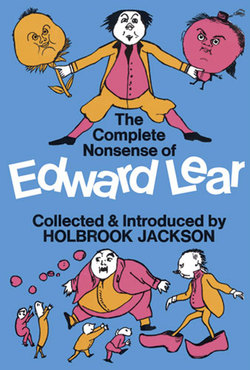Читать книгу The Complete Nonsense of Edward Lear - Edward Lear - Страница 19
На сайте Литреса книга снята с продажи.
15
ОглавлениеLear is an adept at the game of monkeying with words. Like Rabelais and Swift and Joyce he has a genius for fantastic verbal adventures, but often they do little more than play tricks with established spelling. The more familiar the words the more he is tempted to tamper with them. The habit is ingrained, the result not alone of a natural love of the whimsical and an indomitable sense of fun, but it is also, as he himself is aware, an instinctive effort to bridge a gap between idea and expression. ‘Proper and exact “epithets” always were impossible to me,’ he says, ‘as my thoughts are ever in advance of my words.’ And here also we may discover a key to his nonsense, or ‘nonsenses’, as he calls them, which are perhaps ahead of rather than behind his senses.
In the first of his published letters to Fortescue, whom he likes to address as ‘40scue’, he recounts the names of the distinguished foreigners at Rome, in 1848, as: ‘Madame Pul-itz-neck-off and Count Bigenouf—Baron Polysuky, and Mons. Pig.’ He is afraid to stand near the door, lest the announced names should make him grin. In his letters as well as his books he rattles off strings of queer examples with familiar gusto. A projected journey to Egypt makes him ‘quite crazy about Memphis and On and Isis and crocodiles and ophthalmia and nubians and simoons and sorcerers and sphingidos’.
It is natural that Lear should have fallen, as we should now believe, into the then widespread vogue of punning. But he is no slavish imitator of Lamb and Hood. Even his puns have a style of their own which often trips over the boundaries of humour into his own rightful realm of nonsense. Here is an example from a letter of 1865:
‘This place (Nice) is so wonderfully dry that nothing can be kept moist. I never was in so dry a place in all my life. When the little children cry, they cry dust and not tears. There is some water in the sea, but not much:—all the wet nurses cease to be so immediately on arriving:—Dryden is the only book read—the neighbourhood abounds with Dryads and Hammer-dryads: and weterinary surgeons are quite unknown.’
A trip to the Ionian Islands induced a punning declension of archipelago: ‘v.a. Archipelago, P. Archipelament, P.P. Archipelagore.’ In the same manner he has ‘German, Gerwomen and Gerchildren’, and such constructions as ‘geraffino’ for a young Giraffe, and ‘hippo-potamice’ as an improved plural for hippopotamus.
Elsewhere he performs a different trick with an undertone of Learian irony:
‘I went into the city to-day; to put the £125 I got for the ‘Book of Nonsense’ into the funds. It is doubtless a very unusual thing for an artist to put by money, for the whole way from Temple Bar to the Bank was crowded with carriages and people—so immense a sensation did this occurrence make. And all the way back it was the same, which was very gratifying.’
